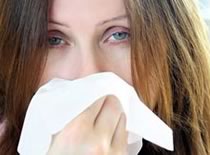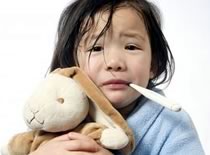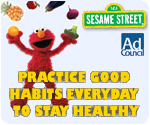What to Do If You Get Flu-Like Symptoms
August 5, 2009 5:00 PM ET
This document has been updated in accordance with the CDC Recommendations for the Amount of Time Persons with Influenza-Like Illness Should be Away from Others . This document provides interim guidance and will be updated as needed.
Background
The novel H1N1 flu virus is causing illness in infected persons in the United States and countries around the world. CDC expects that illnesses may continue for some time. As a result, you or people around you may become ill. If so, you need to recognize the symptoms and know what to do.
Symptoms
 The symptoms of novel H1N1 flu virus in people are similar to the symptoms of seasonal flu and include fever, cough, sore throat, runny or stuffy nose, body aches, headache, chills and fatigue. A significant number of people who have been infected with novel H1N1 flu virus also have reported diarrhea and vomiting. The high risk groups for novel H1N1 flu are not known at this time, but it’s possible that they may be the same as for seasonal influenza. People at higher risk of serious complications from seasonal flu include people age 65 years and older, children younger than 5 years old, pregnant women, people of any age with chronic medical conditions (such as asthma, diabetes, or heart disease), and people who are immunosuppressed (e.g., taking immunosuppressive medications, infected with HIV).
The symptoms of novel H1N1 flu virus in people are similar to the symptoms of seasonal flu and include fever, cough, sore throat, runny or stuffy nose, body aches, headache, chills and fatigue. A significant number of people who have been infected with novel H1N1 flu virus also have reported diarrhea and vomiting. The high risk groups for novel H1N1 flu are not known at this time, but it’s possible that they may be the same as for seasonal influenza. People at higher risk of serious complications from seasonal flu include people age 65 years and older, children younger than 5 years old, pregnant women, people of any age with chronic medical conditions (such as asthma, diabetes, or heart disease), and people who are immunosuppressed (e.g., taking immunosuppressive medications, infected with HIV).
Avoid Contact With Others
If you are sick, you may be ill for a week or longer. You should stay home and keep away from others as much as possible, including avoiding travel and not going to work or school, for at least 24 hours after your fever is gone except to get medical care or for other necessities. (Your fever should be gone without the use of fever-reducing medicine.) If you leave the house to seek medical care, wear a facemask, if available and tolerable, and cover your coughs and sneezes with a tissue. In general, you should avoid contact with other people as much as possible to keep from spreading your illness, especially people at increased risk of severe illness from influenza. With seasonal flu, people may be contagious from one day before they develop symptoms to up to 7 days after they get sick. Children, especially younger children, might potentially be contagious for longer periods. People infected with the novel H1N1 are likely to have similar patterns of infectiousness as with seasonal flu.
Treatment is Available for Those Who Are Seriously III
It is expected that most people will recover without needing medical care.
If you have severe illness or you are at high risk for flu complications, contact your health care provider or seek medical care. Your health care provider will  determine whether flu testing or treatment is needed. Be aware that if the flu becomes widespread, less testing will be needed, so your health care provider may decide not to test for the flu virus.
determine whether flu testing or treatment is needed. Be aware that if the flu becomes widespread, less testing will be needed, so your health care provider may decide not to test for the flu virus.
Antiviral drugs can be given to treat those who become severely ill with influenza. These antiviral drugs are prescription medicines (pills, liquid or an inhaler) with activity against influenza viruses, including novel H1N1 flu virus. These medications must be prescribed by a health care professional.
There are two influenza antiviral medications that are recommended for use against novel H1N1 flu. The drugs that are used for treating novel H1N1 flu are called oseltamivir (trade name Tamiflu ®) and zanamivir (Relenza ®). As the novel H1N1 flu spreads, these antiviral drugs may become in short supply. Therefore, the drugs may be given first to those people who have been hospitalized or are at high risk of severe illness from flu. The drugs work best if given within 2 days of becoming ill, but may be given later if illness is severe or for those at a high risk for complications.
Aspirin or aspirin-containing products (e.g., bismuth subsalicylate – Pepto Bismol) should not be administered to any confirmed or suspected ill case of novel influenza A (H1N1) virus infection aged 18 years old and younger due to the risk of Reye’s syndrome. For relief of fever, other anti-pyretic medications are recommended such as acetaminophen or non steroidal anti-inflammatory drugs. For more information about Reye’s syndrome, visit the National Institute of Health website![]() .
.
- Check ingredient labels on over-the-counter cold and flu medications to see if they contain aspirin.
- Children 5 years of age and older and teenagers with the flu can take medicines without aspirin, such as acetaminophen (Tylenol®) and ibuprofen (Advil®, Motrin®, Nuprin®), to relieve symptoms.
- Children younger than 4 years of age should NOT be given over-the-counter cold medications without first speaking with a health care provider.
Emergency Warning Signs
If you become ill and experience any of the following warning signs, seek emergency medical care.
In children, emergency warning signs that need urgent medical attention include:
- Fast breathing or trouble breathing
- Bluish or gray skin color
- Not drinking enough fluids
- Severe or persistent vomiting
- Not waking up or not interacting
- Being so irritable that the child does not want to be held
- Flu-like symptoms improve but then return with fever and worse cough
In adults, emergency warning signs that need urgent medical attention include:
- Difficulty breathing or shortness of breath
- Pain or pressure in the chest or abdomen
- Sudden dizziness
- Confusion
- Severe or persistent vomiting
- Flu-like symptoms improve but then return with fever and worse cough
Protect Yourself, Your Family, and Community
 Stay informed. Health officials will provide additional information as it becomes available. Visit the CDC H1N1 Flu website.
Stay informed. Health officials will provide additional information as it becomes available. Visit the CDC H1N1 Flu website. - Cover your nose and mouth with a tissue when you cough or sneeze. Throw the tissue in the trash after you use it.
- Wash your hands often with soap and water, especially after you cough or sneeze. Alcohol-based hand cleaners* are also effective.
- Avoid touching your eyes, nose and mouth. Germs spread this way.
- Try to avoid close contact with sick people.
- If you are sick with a flu-like illness, stay home for at least 24 hours after your fever is gone except to get medical care or for other necessities. (Your fever should be gone without the use of fever-reducing medicine.) Keep away from others as much as possible. This is to keep from making others sick.
- If you are sick and sharing a common space with other household members in your home, wear a facemask, if available and tolerable, to help prevent spreading the virus to others. For more information, see the Interim Recommendations for Facemask and Respirator Use.
- Learn more about how to take care of someone who is ill in "Taking Care of a Sick Person in Your Home"
- Follow public health advice regarding school closures, avoiding crowds, and other social distancing measures.
- If you don’t have one yet, consider developing a family emergency plan as a precaution. This should include storing a supply of extra food, medicines, and other essential supplies. Further information can be found in the "Flu Planning Checklist
 "
"
- Links to non-federal organizations are provided solely as a service to our users. These links do not constitute an endorsement of these organizations or their programs by CDC or the federal government, and none should be inferred. CDC is not responsible for the content of the individual organization Web pages found at these links.
Get email updates
To receive daily email updates about this site, enter your email address:
Contact Us:
- Centers for Disease Control and Prevention
1600 Clifton Rd
Atlanta, GA 30333 - 800-CDC-INFO
(800-232-4636)
TTY: (888) 232-6348
24 Hours/Every Day - cdcinfo@cdc.gov


